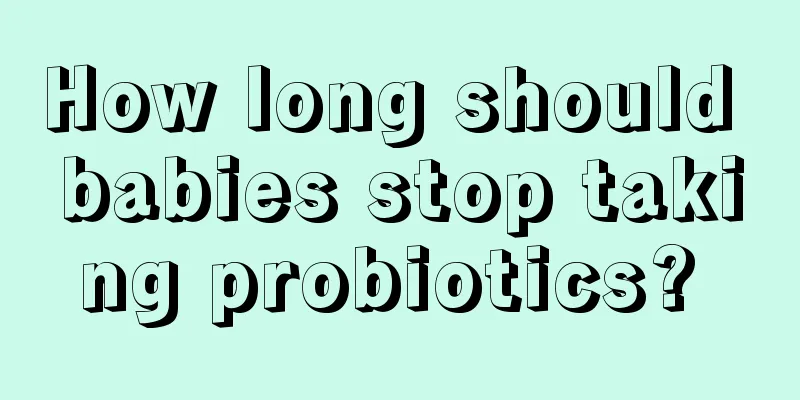How long should babies stop taking probiotics?

|
The gastrointestinal function of babies is relatively weak, and their digestive ability is relatively poor. In addition, the flora in the baby's intestines may be unbalanced, so the baby is prone to some intestinal diseases, such as diarrhea and abdominal pain. In order to prevent these diseases, parents can give their babies probiotics. Probiotics can improve the baby's digestive ability and prevent a variety of intestinal diseases. The following introduces the correct way for babies to take probiotics. How long should babies stop taking probiotics? If your baby is taking probiotics, it depends on what kind of probiotics they are. If it is a probiotic like Mami Love, then the baby should take a little when she is sick, and then stop taking it after she recovers. If the probiotics are in the form of health supplements, then generally they should be taken for about three months before there is an effect. Many babies have gastrointestinal problems such as indigestion. This is because their gastrointestinal functions are not yet perfect, so they usually need to regulate their intestines. However, some parents think that the more probiotics their children take, the better. This is a misunderstanding. So what happens if your baby eats too many probiotics? Although probiotics are bacteria that are beneficial to the human body, in theory there is no problem in eating more of them. However, each baby's physique is different, and the baby also has a certain degree of self-regulation ability, so the baby still needs to take in probiotics in moderation and not blindly take in large quantities. There is absolutely no need to supplement probiotics for growing babies, because probiotics are not health products, tonics, or panaceas. Probiotics are used in two situations: 1. Since the baby has been taking antibiotics for a long time, the antibiotics not only kill the pathogens, but also kill the probiotics that also survive, so probiotics need to be supplemented to re-establish the body's microecological barrier. 2. When babies have diarrhea, a large amount of probiotics are excreted from the body, which makes it impossible to balance the pathogens, leading to intestinal imbalance and thus causing disease. Therefore, it is necessary to supplement probiotics to rebalance the intestinal flora and maintain intestinal health. Even so, probiotics should only be taken in short periods of time under the knowledge of a doctor and should not be taken over the long term as long-term intake may pose potential harm to the human body. Medicine shows that long-term intake will cause the intestines to slowly lose the ability to reproduce probiotics, which will in turn cause intestinal dependence, which is called probiotic dependence in medicine. Once you get the disease, you will have to take artificially synthesized probiotic products for the rest of your life. To keep good health. |
<<: How long does it take from irregular uterine contractions to birth?
>>: What are the signs of childbirth in the late pregnancy?
Recommend
What are the benefits of doing chest expansion exercises
Exercise is a very important thing in life, becau...
You should learn how to freeze and preserve the soaked sea cucumbers
Sea cucumbers are a very common seafood dish, but...
Feeling very tired and weak
Feeling tired, exhausted and weak may be caused b...
Early symptoms of throat cancer
The early symptoms of laryngeal cancer mainly inc...
How harmful is secondhand smoke? Very harmful
The harmful substances in second-hand smoke are m...
What are some back stretching exercises?
Nowadays, most young people, especially those wor...
What are the physiological functions of the liver
The main physiological function of the liver is d...
Do you know the importance of indoor environment to human body?
Two-thirds of our time is spent indoors, and the ...
What are the symptoms of kidney yin deficiency?
Kidney Yin deficiency is also a type of kidney de...
What causes facial muscle pain?
Muscle pain is a common phenomenon in life. Muscl...
Can surgery be performed on early stage nasopharyngeal carcinoma?
Can surgery be performed on early-stage nasophary...
Five symptoms of advanced laryngeal cancer
People who are over 40 years old and have the hab...
What are the characteristics of liver disease
my country is a severely affected area of liver...
What is the reason for pain on the back of the left hand
There are many reasons for the pain in the back o...
What to do with the tooth cavity after tooth extraction
After a tooth is extracted, a deep hole will be l...









